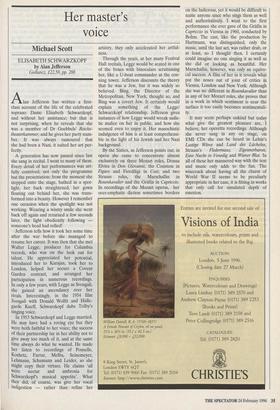Her master's voice
Michael Scott
ELISABETH SCHWARZKOPF by Alan Jefferson Gollancz, £22.50, pp. 288 Alan Jefferson has written a first- class account of the life of the celebrated soprano Dame Elisabeth Schwarzkopf, and without her assistance; but that is not surprising, when he reveals that she was a member of Dr Goebbels' Reichs- theaterkammer, and he gives her party num- ber. It was always rumoured that she had been a Nazi, it suited her art per- fectly.
A generation has now passed since last she sang in recital. I went to many of them. Every detail of her performances was art- fully contrived, not only the programme but the presentation; from the moment she stepped onto the stage, bathed in a spot- light, her back straightened, her gown floating out behind her, she was trans- formed into a beauty. However I remember one occasion when the spotlight was not working. Wearing a wintry smile she went back off again and returned a few seconds later, the light obediently following someone's head had rolled!
Jefferson tells how it took her some time after the war before she managed to resume her career. It was then that she met Walter Legge, producer for Columbia records, who was on the look out for talent. He appreciated her potential, introduced her to Karajan, took her to London, helped her secure a Covent Garden contract, and arranged her participation in numerous recordings. In only a few years, with Legge as Svengali, she gained an ascendancy over her rivals. Interestingly, in the 1954 film Svengali with Donald Wolfit and Hidle- garde Kneff, Schwarzkopf dubs Trilby's singing voice.
In 1953 Schwarzkopf and Legge married. He may have had a roving eye but they were both faithful to her voice; the success of their partnership lay in her ability not to give away too much of it, and at the same time always do what he wanted. He made her listen to recordings of Ponselle, Koshetz, Farrar, Melba, Seinemeyer, Lehmann, Schumann and Leider, so she might copy their virtues. He claims 'all were nectar and ambrosia for Schwarzkopf's musical appetite'. What they did, of course, was give her vocal indigestion — rather than refine her artistry, they only accelerated her artful- ness.
Through the years, at her many Festival Hall recitals, Legge would be seated in one of the boxes with binoculars scrutinising her, like a U-boat commander at the con- ning tower. Jefferson discounts the theory that he was a Jew, but it was widely so believed. Bing, the Director of the Metropolitan, New York, thought so, and Bing was a covert Jew. It certainly would explain something of the Legge/ Schwarzkopf relationship. Jefferson gives instances of how Legge would wreak sadis- tic malice on her in public, and how she seemed even to enjoy it. Her masochistic indulgence of him is at least comprehensi- ble in the light of his Jewish and her Nazi background.
By the Sixties, as Jefferson points out, in opera she came to concentrate almost exclusively on three Mozart roles, Donna Elvira in Don Giovanni, the Countess in Figaro and Fiordiligi in Cosi; and two Strauss roles, the Marschallin in Rosenkavalier and the Gratin in Capriccio. In recordings of the Mozart operas, her over-emphatic diction sometimes borders on the ludicrous, yet it would be difficult to name anyone since who sings them as well and authoritatively. I went to the first performance she ever gave of the Gra& in Capriccio in Vienna in 1960, conducted by Bohm. The cast, like the production by Hartmann, was distinguished, only the music, until the last act, was rather drab, or at least, so I thought then. I certainly could imagine no one singing it as well as she did or looking as beautiful. Her Marschallin, however, was only an equivo- cal success. A film of her in it reveals what put the noses out of joint of critics in Vienna, London and New York. Although she was no different in Rosenkavalier than in any of her Mozart roles, she proves that in a work in which sentiment is near the surface it too easily becomes sentimentali- tY.
It may seem perhaps unkind but today what give the greatest pleasure are, I believe, her operetta recordings. Although she never sang in any on stage, on EMI CDs she can be heard in Lehar's Lustige Witwe and Land des Liichelns, Strauss's Fledermaus, Zigeunerbaron, Eine Nacht in Venedig and Wiener Blut. In all of these her mannered way with the text and music only adds to the fun. The wisecrack about having all the charm of World War II seems to be peculiarly appropriate in her case, it is fitting in works that only call for simulated depth of emotion.


























































 Previous page
Previous page